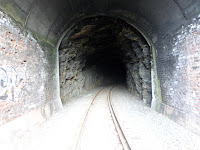My last week in South Africa was mainly about the animals-
Addo Elephant Park and Aliwal Shoal Marine Reserve.
In both of these places I questioned just how brave I really
am when I am no longer top of the food chain. Lions, buffalo, hippos and a
whole range of sharks are a reality for people who live in South Africa, and
dealing with them in a safe way is important. A ranger at Addo has survived
lion, elephant and buffalo attacks in his time working in the park, and for
this reason it is said he will go down in history. As well as this, a shark
expert in Aliwal Shoal told me the most effective way to deal with aggressive
sharks is to punch them in the face. No really. It is his job to beat up sharks
that may get too feisty with divers. It is somehow reassuring to know our
fight-or-flight instincts are still intact, and at the same time scary that in
the end that is all we really have when threatened by nature.
Yet so many of us are still fascinated and not scared of these
hostile creatures, ending up with attacks happening relatively often. It is
easy to see why when you drive around Addo and stumble across a whole family
complete with small children who have jumped out of their car to try and take a
photo with the lions.
Ignorance, bravery or craziness? It is hard to tell with all
people, but ignorance seems to be the most common problem. When the lions are
so far away and appear to be sleeping, they seem gentle as if you could edge
closer to them- but they run at 80km an hour and are opportunist killers.
Humans are easy picking for them, and that is how accidents happen.
But ignorance isn’t only a problem for people. When shark
attacks occur, there is often an outcry to kill sharks in the area in order to
protect the humans who choose to surf/dive there. But (apparently) sharks are
quite placid by nature, and when I was in their territory you could almost
believe that. Not one of the experienced divers or experts on wildlife was
scared of sharks, because they are confident and know exactly how to deal with
them. I think I need a little more practice to have that kind of bravery.
Furthermore, Addo Elephant Park has lost two rhinos so far
this month to poachers. Not only this, but warthogs apparently go missing often
as people come in, shoot them, and take them home for tea. The ranger I talked
to was disgusted by this, but at the same time chuckled and told me they are very
tasty though. There are so many warthogs, it is hard to feel sympathy for them
while you are there, but the much bigger problem of poaching of the endangered
animals calls into question the ignorance of the people who still buy these
illegal products.
In short, it seems very clear that educating people could
help save so many lives- both animal and human.
I have left South Africa now and I'm currently chilling in a hotel in Malaysia! I was sad to leave as there is SO much I could have done, but being unexpectedly bumped up to business class on the flight certainly made it easier! Thank you very much Qatar Airways, and see you later South Africa! I'll be back.












